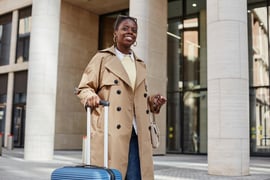The metaverse is a hot topic in tech and is transforming the travel industry as we know it. Let’s look at the metaverse, digital twins, and VR in more detail.
Ever fancied the thrill of a spectacular Kenyan safari? Or sunning yourself in seclusion on the unspoilt beaches of Barbados?
Us too.
We all have those dream destinations waiting patiently at the top of our travel lists. Well, imagine if you could put yourself there without actually leaving your living room. A ‘‘try before you buy” experience that would allow you to glimpse exactly what your trip would be like – even down to the views from your hotel room or your seat on the plane.
Welcome to the metaverse.
The digital era is taking its next steps and the travel industry is fully embracing it, in the form of fully immersive, 360 experiences powered by VR.
In this article we’ll take a look at the digital phenomenon that is the metaverse. How does it work? In what way is it transforming the world of travel? And what does the future of travel hold with meta in it?
First up, let’s start with what the term “metaverse” actually means.
What is the metaverse, exactly?
It’s a good question. And one that is up for hot debate in the technology world. The reality is that the metaverse is being defined as it takes shape, just as the internet was in the ’90s as it started to become mainstream.
But since global giants such as Microsoft, Apple, and Facebook are investing big money into making the metaverse happen, we’ll soon be needing to understand it better. Think of the metaverse as a 3D model of the internet. A world that runs parallel to the physical one as we know it – a place where you can travel, meet, play, and shop virtually.
An example that’s taken the gaming world by storm is Roblox: one of the most successful current players in the metaverse. In essence, it’s a digital world where you and other people both have an avatar, and you interact with them through their avatars. According to the Guardian, around 1.5 million children in the UK alone are playing it every day.
Gaming and entertainment are natural starting points, but the idea is growing in popularity in other sectors – a third of UK consumers are planning to use the metaverse for online shopping. So while defining the metaverse is different depending on who you talk to, most people agree it has the potential to change our lives as dramatically as the traditional internet has.
Digital twinning
Digital twins are transforming the way that online bookings are experienced. They are essentially an extremely accurate digital copy of a space, object, or person that can be explored in 3D and at its most complex level, driven by real-time data.
For example, imagine a digital twin of a road network that includes all potholes, roadworks, and traffic jams – one that is to scale and that you can explore in VR. It sounds like something from a sci-fi film, but it’s actually in motion now as National Highways in the UK has set out a plan to implement digital twins of the UK’s road networks by 2050.
Matterport is a UK company that is one of the leading creators of digital twins for travel and hospitality (amongst many other industries). Its technology lets you explore hotel suites, poolside bars, or even the first-class cabin in a luxury aircraft. Using specialist cameras and its own software platform, Matterport can scan and recreate almost any interior into 3D that can then be explored in VR.
The idea is that these virtual spaces will become part of the larger metaverse.
Conferences and events
The “try before you buy” idea can even scale up to include exploring an entire conference centre or event location before booking. This can save costly and time-consuming trips when looking for a suitable venue. The Royal College of Physicians, for example, offers a full 3D walkthrough of the venue.
Again, this technology is giving us a glimpse of what the fully realised metaverse might look like. Now we browse websites for venues on our laptops and mobiles – in the future we may well do that entirely in immersive 3D.
What does the future hold?
The metaverse is not meant to replace the physical travel experience – it will be used to inspire a more meaningful one by giving customers a rich and interactive way to browse and buy travel experiences. As more metaverse travel options emerge, it is likely to play a bigger part in the tourism industry.
The post-pandemic world is changing, with digital customers expecting more from their online experience than ever before. Given the incredible pace at which the digital technology is evolving, we might not have to wait that long to see it become a new (virtual) reality.
Key takeaways
- The introduction of the metaverse to the travel industry is taking the sector by storm.
- Customers will have the option to “try before they travel” using fully-immersive, VR experiences.
- Digital twins are allowing customers to view their hotel suite, poolside bars, or view from their plane seat before they even travel.
- Conference and event locations are offering a full VR walkthrough viewing option instead of travelling to view.
Have you had any experiences with the metaverse or digital twins yet? What do you think of the “try before you travel” concept? We’d love to hear from you.










